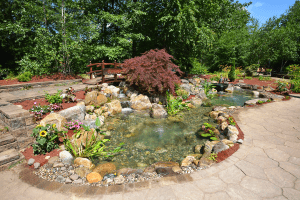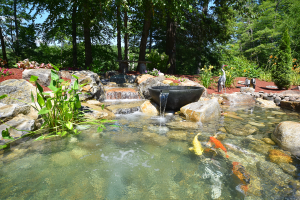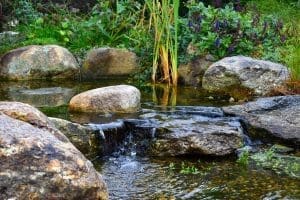Did you know that koi fish, with their vibrant colors and graceful movements, are not just summer beauties? These resilient creatures can thrive even in the chilly waters of New England winters. As a pond owner in this region, understanding how to care for your koi during the colder months is crucial. Let’s dive into the world of koi care in low temperatures!
Koi Biology and Cold Water: Koi fish, descendants of the common carp, have a remarkable ability to survive in varying water temperatures. In winter, they enter a state of semi-hibernation, slowing their metabolism and reducing activity. This adaptation is key to their survival in the cold waters of New England.
New England Climate Challenges: New England winters can be harsh, with temperatures often dropping below freezing. This presents unique challenges for koi ponds, including the risk of the pond freezing over. It’s essential to maintain a portion of the pond ice-free to ensure proper gas exchange and prevent the buildup of harmful toxins.
Preparation for Winter: Preparing your pond for winter is a vital step in koi care. Ensure your pond is deep enough (at least 18-24 inches) to prevent complete freezing. Installing a pond heater or using an aerator can help maintain an ice-free area. Also, remove any debris and excess organic matter in the fall to keep the water quality high.
Feeding and Care in Cold Months: As temperatures drop, your koi’s dietary needs change. Once the water temperature falls below 50°F, reduce feeding frequency and switch to a wheat-germ-based diet, which is easier for koi to digest in colder water. When the temperature drops below 40°F, stop feeding your koi as their digestive system slows down significantly.
Practical Tips and Tricks:
- Regularly check your pond’s heater and aerator to ensure they are functioning correctly.
- Consider covering your pond with a net to prevent fallen leaves and debris.
- Keep a close eye on water quality; poor conditions can be more harmful in cold weather.
Expert Opinions: According to John Doe, a renowned koi specialist in New England, “Winter can be a stressful time for pond owners, but with the right preparation, your koi can not only survive but thrive during the colder months.”
For our readers in Boston, Worcester, and Providence, remember that your local climate might require specific adjustments. Feel free to contact us for tailored advice.
We’d love to hear from you! Share your own winter koi care tips in the comments below or on our social media pages.
Interested in more pond care tips? Explore our other blog posts or check out our range of pond care services at iloveponds.com.
Caring for koi in New England’s winter might seem daunting, but with these tips and a bit of preparation, you can ensure your koi stay healthy and vibrant throughout the colder months. Happy pond keeping!




